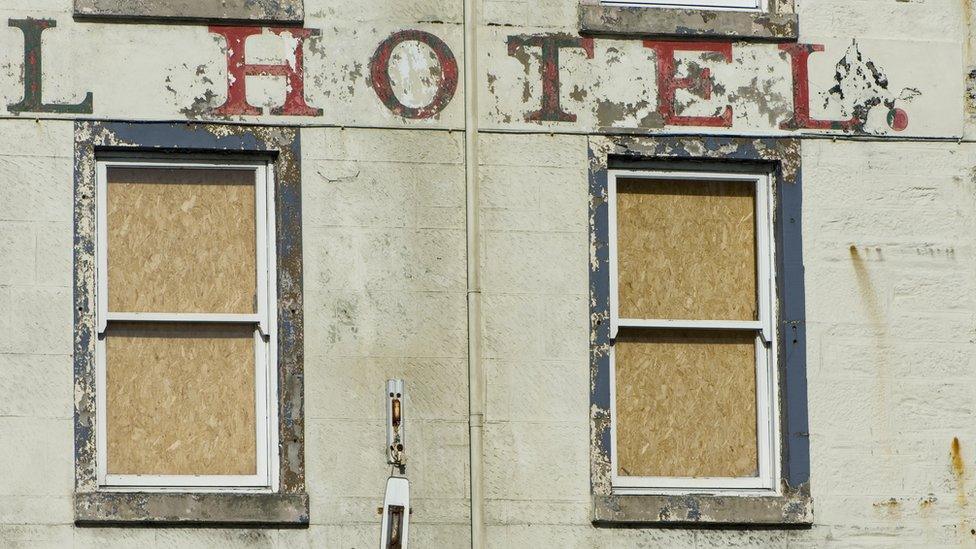Leisure centres and universities could face business rates bills
- Published
- comments
The report said childcare centres should be exempt from business rates
Leisure centres, some golf clubs, private schools and universities should be brought fully under the business rates system, according to a review.
The Barclay Report into non-domestic rates, external has also recommended that childcare centres should be exempt.
The system had faced strong criticism, particularly from hospitality firms.
The review was commissioned by the Scottish government in March last year and headed up by Ken Barclay, former head of Scottish operations for RBS.
Scotland's Finance Secretary Derek Mackay welcomed the report and said the government would "respond swiftly" to its recommendations.
He added: "I know the review group have worked incredibly hard, spending more than a year engaging closely with the ratepayers across Scotland before compiling this report. I would like to take this opportunity to thank them for their substantial efforts."
The report's recommendations included;
targeted reductions in bills to help retain shops in town centres
the supplementary charge for large business premises should be cut in half, bringing it into line with England
for businesses investing in expansion, an extended 12-month period of business rates relief
an increase in the frequency of revaluations, to every three years from 2022
a legal duty on businesses to provide information for assessors
Mr Barclay carried out his review alongside two business experts, a lawyer and retired civil servant.
Its remit was to examine the system in a way that "encouraged business growth, improves fairness and continues to raise the same total amount for public services".
It looked at radical reforms, and the impact of the digital economy, but concluded that the basis of the current system should be maintained.
The review was instructed to be revenue neutral and was not tasked with looking at the controversy surrounding the 2017 revaluation of premises.
Business rates are based on the notional rental value for offices, factories, shops, restaurants, hotels, warehouses and public buildings.
Ministers remain committed to the Small Business Bonus Scheme, external, which exempts up to 100,000 properties with lower rental valuations, until at least 2021.
That is worth £180m to businesses and much of it was funded this year through the large property supplement.
However, the Barclay Report recommended a review of that scheme, questioning whether it was right that some should pay nothing, with a steep rise in costs for those just over the rental threshold of £15,000.
It is suggested those being given relief could meet other goals set by government, such as paying the Living Wage, or providing apprenticeships.
For many small firms, their business rates bill is the second biggest cost they face, after staff pay.
What might be affected by the recommendations?
Local government - The biggest change recommended in the report was for so-called arm's length organisations, set up by councils to operate services independently, with charitable status. These include leisure and sports centres, and arts venues including theatres, libraries, museums and galleries. One reason for creating such vehicles has been that charitable status means avoidance of business rates, with the Scottish government paying councils most of the relief. The Barclay Review does not question the charitable status, but says that it should not mean a blanket exemption. In the case of gyms, cafes, shops and venue hire, they are in competition with private firms that have to pay rates. The cost of such a change for the arm's length organisations is estimated at £45m, though much of that could be recycled through council budgets.
Independent schools are charities and benefit from reduced or zero rates bills, whereas council (state) schools do not qualify and generally will pay rates. The report says this inequality should end by removing eligibility for charity relief from all independent schools. o. The recommended change to that would cost the private sector £5m per year.
Universities are registered charities and can claim business rates relief. The Barclay Review recommends they should keep the relief for their core education and research function but they should start to pay business rates where they compete with private firms. That would affect the letting of student accommodation during holidays, in competition with hotels.
Sports clubs could be affected by the change too. Some lucrative golf clubs, with considerable assets, do not pay business rates. While keeping community sport facilities as they are, it is suggested that the bigger clubs should pay.
The report aims to close loopholes. That includes short-term relief for empty buildings.
It would also require owners of holiday homes, who claim to be renting them as businesses, to prove they are earning money from lets, rather than avoiding residential council tax.
The review group wanted to recommend a shift in the annual inflation uplift, replacing the higher measure of the retail price index. But they said this could not be done within their remit of maintaining the total tax take.
'Not about penalties'
It has recommended that a roll be kept of almost all rateable valuations of non-domestic property, which would require valuation of farms and forests, while continuing current exemptions for those.
In his introduction to the report, Mr Barclay wrote that reduced administration costs should help businesses.
He said: "Revenue raising measures may not be popular with some. They are not about penalising particular sectors. They are about removing anomalies, creating a level playing field and reducing avoidance.
"The 30 recommendations combined will, I believe, improve the economic climate in Scotland and give Scotland a competitive advantage in growing existing businesses and attracting new business."

Was the review radical enough?

By Douglas Fraser, BBC Scotland business and economy editor
The Barclay Review could have been a lot more radical. The rise of the digital economy is a big challenge to a tax system based on building rental value, and may eventually require radical solutions.
But for the 2020s, this review opts for changes to the current system - closing loopholes, levelling the playing field, giving a nudge or two of help to businesses that want to invest, grow and be responsible employers.
Anything more radical ran the risk of being shelved. That has happened to reviews of council tax.
In the filing cabinet marked "politically too difficult", that tax on residential property remains stuck with its 1991 valuations.
Anything more radical for business would also have meant divergence from England and Wales. On the contrary, the Barclay Report recommends that the supplement for bigger properties should be cut, to come into line with the rest of the UK.
Devolution was intended to allow for more divergence, and the Scottish National Party has talked about the need to have more business tax powers to help grow the economy.
Reform over the past 18 years of the Scottish Parliament has been limited to small business reliefs. It demonstrates that divergence from the rest of the UK is tougher than the rhetoric might suggest, particularly where it risks harm to the economy.
- Published22 August 2017

- Published18 March 2016

- Published21 February 2017

- Published16 February 2017

- Published16 February 2017

- Published16 February 2017

- Published12 February 2017

- Published26 January 2017

- Published5 September 2016

- Published16 December 2015
